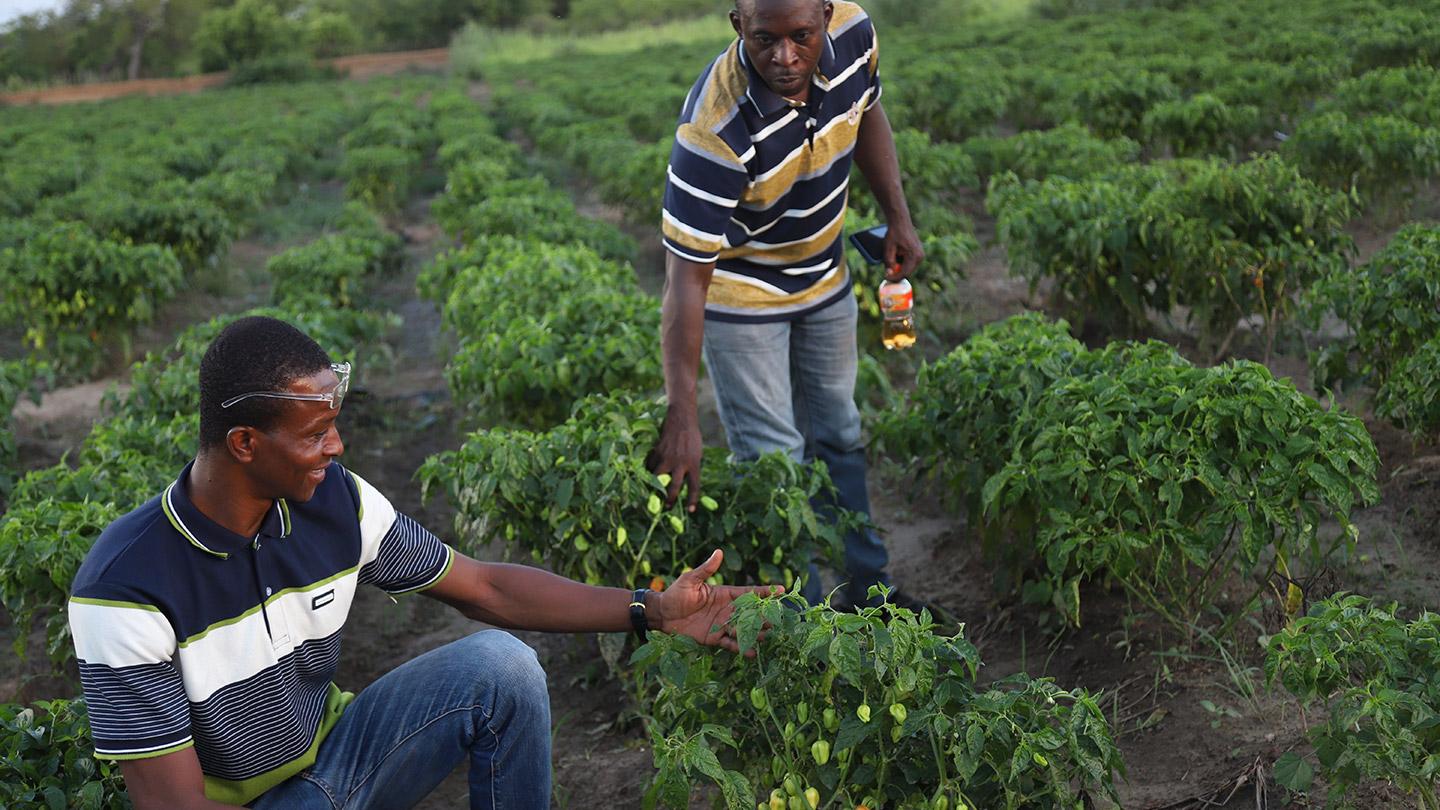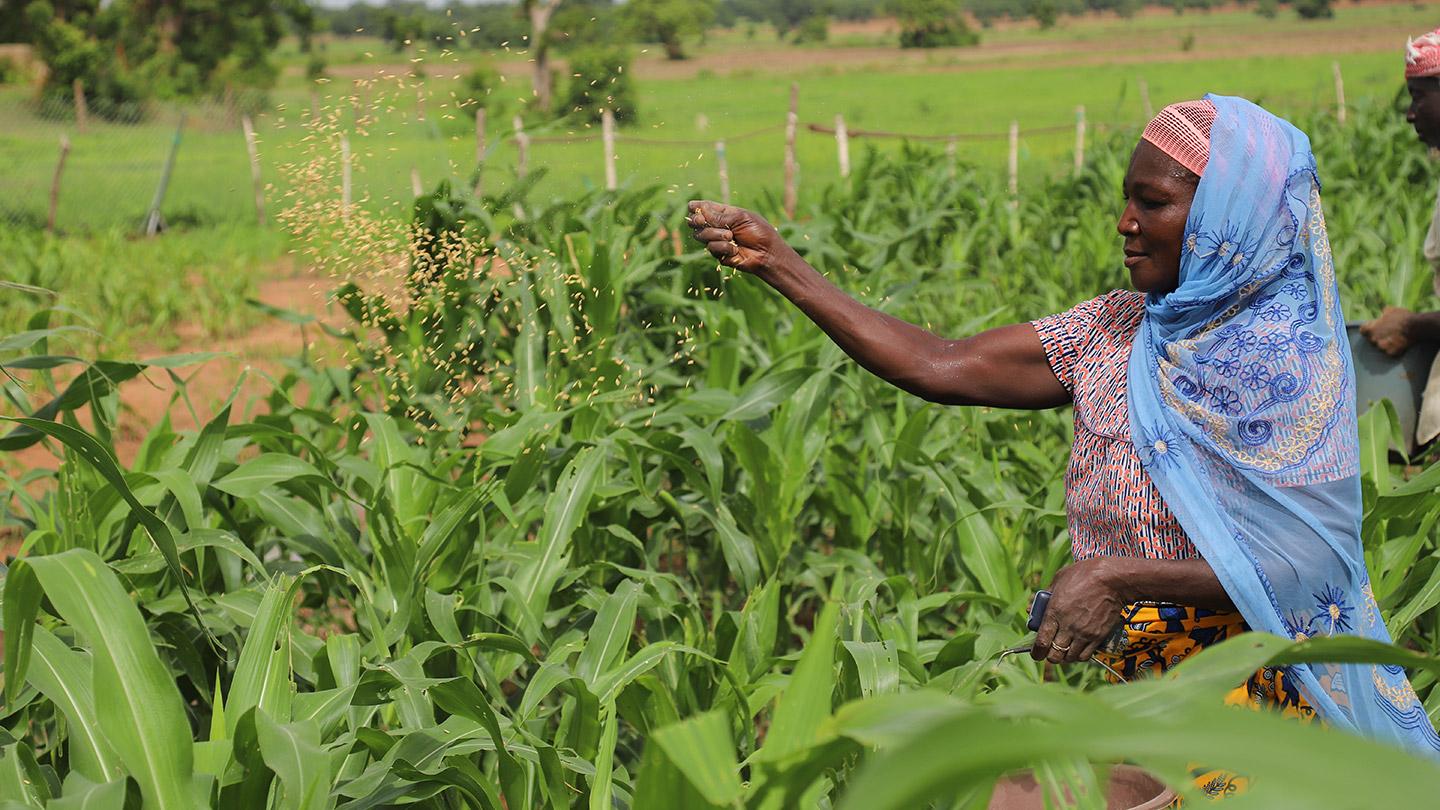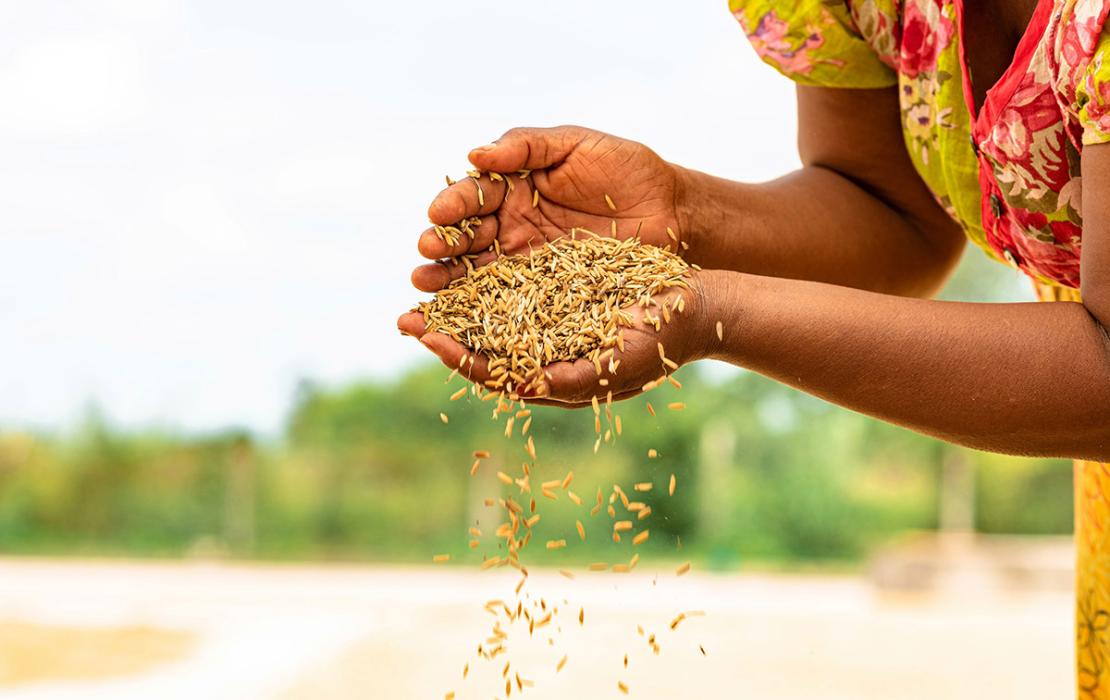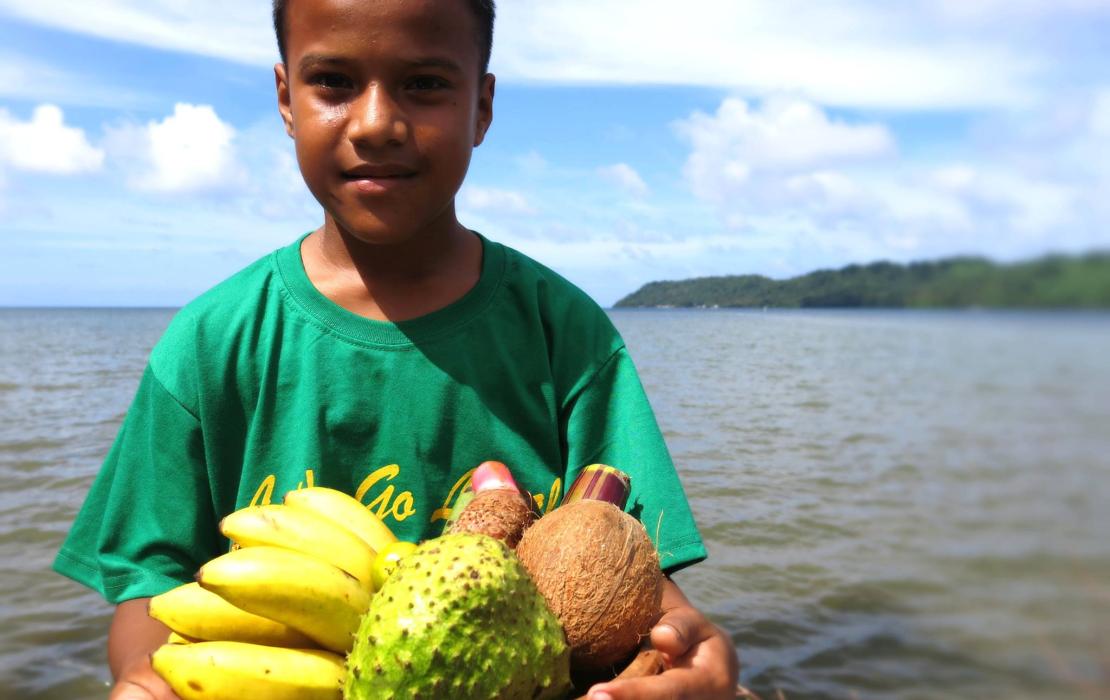
Photo: Open Ghana
Across the African continent, drought affects rural livelihoods, threatening food security, diminishing household incomes and displacing communities. Innovative solutions developed by local innovators can minimize those consequences during the dry season and strengthen resilience.
In Ghana, an organization has established dry-season gardens using solar water pumping machines and helped set up village savings and loans mechanisms. The organization provides farmers with tools, seeds and training to cultivate vegetables and fruits in the dry season.
In Kenya, a local innovator is experimenting with local leaves, herbs and mineral salts to develop an affordable, sustainable meal product for dairy goat keepers. This innovation has already boosted livestock productivity, positively influencing food security and local incomes.
Here are their stories.

Photo: Open Ghana
New fences, solar water pumps and loan schemes for vulnerable farmers in Ghana
Like many other women in the village of Goere, Ghana, Assibi Ayambila says she used to feel trapped in loneliness and isolation.
“Our husbands worked tirelessly as security men, leaving us to manage our households alone. It was a challenging and often lonely experience,” she says.
Thankfully, the pressure on her husband has eased now that she has a sustainable source of food and income: a dry-season garden.
The garden was set up by Open Ghana, using a grant from the Adaptation Fund. The fund supports climate innovation in developing countries through its UNDP-Adaptation Fund Climate Innovation Accelerator (AFCIA).
Ayambila and the rest of the Goere community say they are already reaping the benefits.
The group established similar gardens in several other villages, including Vugundaa and Mettoh Yipaal.
They also built fences, established community savings schemes, and procured solar water pumps for irrigation during the dry season.
“We have a lot of sunshine in Ghana,” says Isaac Naanpukin Kombat, executive director of Open Ghana. “Instead of using diesel water pumping machines, which will involve the farmers having to buy fuel for the machine, we are using the solar water pumping machine.”
While the gardens will certainly boost food security and nutrition in these areas, Kombat says their focus was really on creating sustainable incomes for the women, youth and persons with disabilities who live there. He says that despite available land, water and ready markets for dry season gardening, these vulnerable groups are unable to raise capital to invest in irrigation equipment.
Photo: Open Ghana
In Mettoh Yipaal, a new solar water pump and fencing materials complemented the construction of a mud wall, which protects crops from wild animals during the dry season.
As in many of their intervention areas, Open Ghana also helped establish a Village Savings and Loans Association (VSLA) here. The association meets weekly so that residents can pool their savings, while sharing experiences and encouragements to foster social cohesion.
Kombat says people in Mettoh Yipaal previously had to travel as far as Burkina Faso to purchase vegetables for retail, making it expensive to sell and for consumers to buy locally.
His team reports that the impact of people in the community growing vegetables in their own gardens instead has been remarkable so far.
“Mettoh-Yipaal has now become a vibrant hub for producing fresh vegetables. The arid land has been transformed into a productive one. Local vegetable businesses have flourished, fostering entrepreneurship and creating economic opportunities.”
Kombat says several other communities have expressed interest in setting up their own dry-season gardens. “We are on the watch for extra funding to be able to extend this to other communities so that we can make a bigger impact,” he says.
In the meantime, he advises anyone who would want to replicate Open Ghana’s intervention to ensure gender inclusivity in their projects.
He says in this part of the world, people’s traditional and religious beliefs mean that it is common for men and women to work alone rather than together.
“We were able to overcome it by training people on gender and social inclusion, and they now see themselves as a mixed group who work together to address the challenges they face, and then benefit from group synergy,” he says.
Photo: World Neighbours
Kenyan inventor’s eco-friendly product feeds dairy goat economy
Joe Ouko is an innovator from Kisumu County, Kenya, who experimented with local leaves, herbs and mineral salts to create an affordable, sustainable meal product for dairy goat keepers.
The final product, known as LOFODA-G-Meal (Locally Formulated Dairy-Goat Meal), was created with the help of World Neighbours, an international development organization that works to alleviate hunger, poverty and disease.
They say Ouku’s creativity and local knowledge has already boosted livestock productivity, which will have a positive influence on food security and local incomes.
“It is not only benefiting him as a person, but the local community as well. He has created a business engine; a vehicle for marketing the product,” says Vincent Mariadho, national coordinator of Prolinnova–Kenya, an initiative of World Neighbours. “He has managed to mobilise nine more people within this community-led business," he says.
Mariadho’s team used a grant from the Adaptation Fund to boost local capacity for manufacturing LOFODA-G-Meal and for dairy goat farming in general. The fund supports climate innovation in developing countries through the Adaptation Fund Climate Innovation Accelerator (AFCIA).
“Using this funding, we have managed to mobilise the community to embrace dairy goat farming as an alternative source of revenue,” says Mariadho.
He explains that other than livestock diseases, feed availability and quality is one of the biggest challenges facing farmers. He says Ouka’s LOFODA-G-Meal completes a local economic circle neatly in that it already has an immediate local market and the farmers who use it have opened new income streams for themselves.
For example, Jane Jagero, who has been a dairy goat farmer since 1999, saw her goats’ milk production increase dramatically when they started eating the LOFODA-G-Meal feed.
"Jane initially was actually raising indigenous goats, which would go off into the environment to feed on the local vegetation. Then, in the evening, they were brought back home,” explains Mariadho.
“The production in terms of the milk was very low, and she was not keeping them for milk,” he says. In fact, he says Jagero previously thought one could only get milk from cows, when in reality the goats were simply not productive before. The project helped her acquire a new breeding stock of goats better suited to the local environment, and she fed them the locally-manufactured LOFODA-G-Meal, almost doubling their milk production.
“Since I have been using LOFODA, it has improved my production of milk and the rate at which the goats are growing much faster,” said Jagero, adding that she is making more money now. “In terms of production, before I was getting two litres but now I am getting three litres to three-and-a-half litres per day.”
Photo: World Neighbours
Mariadho says the project also focussed on empowering marginalized groups such as women and youth, by providing work opportunities within the manufacturing pipeline of the goat feed.
The key to the success of the LOFODA-G-Meal product was recognising that local knowledge and scientific solutions can be integrated to build climate resilience.
In recognition of this fact, Mariadho’s team also introduced community-based advisory services, where local experts share their insights and best practices around dairy farming.
Mariadho says this local Kenyan innovation shows that farmers are already adapting and innovating in the face of climate change. The role of organizations such as Open Ghana and World Neighbours is to find these innovations, integrate them with other scientific knowledge and spread the ideas further.
***
These stories have been co-created with support from the Climate and Development Knowledge Network (CDKN) and UNDP in the framework of the UNDP-managed Adaptation Fund Climate Innovation Accelerator programme (UNDP-AFCIA).
Supported by financial contributions from the Adaptation Fund and the European Union, the UNDP-AFCIA programme has awarded 44 micro and small grants to locally led organizations across 33 countries worldwide, accelerating their innovative solutions to build resilience in the most vulnerable communities.
UNDP-AFCIA is one of two featured programmes under the Adaptation Innovation Marketplace (AIM), a multi-stakeholder strategic platform that promotes scaled-up adaptation at the local level.

